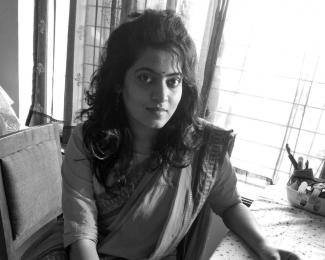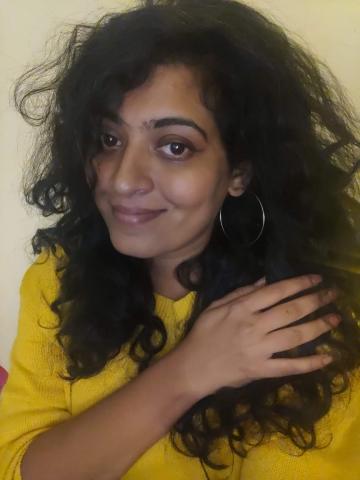
Manaswini Lata Ravindra, 38, a theatre artist, who has been off the anti-epileptic drugs for 17 years, recalls her challenging childhood and how epilepsy shaped her personality.
Please tell us a bit about your condition – when and where were you first diagnosed with epilepsy?
I was 10-years-old when I was diagnosed with epilepsy. Earlier I used to have shut downs/ blackouts many times a day. I used to feel unconscious for some seconds to minutes. I never had convulsions (seizures). So my epilepsy was not diagnosed immediately. My parents had taken me to all kinds of specialists, even to a psychiatrist. Because they thought this could be my way of attention seeking. But Dr Anand Nadkarni, child psychologist, told them that this could be epileptic and then my epilepsy was diagnosed.
What type of epilepsy did you have? What were your early symptoms?
I had clonic tonic epilepsy. As I mentioned above I used to have complete black outs. Sometime more than 30 - 40 per day. I used to fall down for some time, and wouldn’t remember the exact what happened at that time. I didn’t realise it earlier. I used to feel dizzy and fall down. I didn’t tell this to my parents because the numbers were very less at the beginning. Once I fell in my school and my teachers informed my parents. I do not remember any other symptoms of it. It was just a black out for some time.
How did epilepsy affect your childhood? Were there any setbacks?
I was a quiet child even before epilepsy. I used to write poems and used to enjoy my own world. Just when this started my parents decided to stop my swimming, karate and dance class. So I became more introverted. I started reading more, and started drawing a lot and I used to enjoy spending time with myself. Many times I had to miss school. It didn’t bother me that my activities had stopped. But when I grew little old, as in when I was 12-13, I used to feel that my parents are little over protective. Though they never asked me not to participate in anything, after my drugs started. Slowly I had started doing some outside activities. Actual epilepsy didn’t affect me, it was the side effects that affected me a lot.
What medications were you prescribed for your epilepsy? Did you have to go through several drug changes to settle for the right one?
I used to take Tegretol and Valparin. First I used to take only Tegretol, but my condition was not totally in control so the doctor prescribed Valparin. But it had side effects. I used to feel tired all the time and also used to have headaches. I used to hate that tablet so my mother decided to give this name to one of my doll, so I would like it. It was making me very lethargic so we consulted with the doctor and stopped it.
Anti-epilepsy drugs (AEDs) can have major side effects like thinning of bones, irregular menstrual periods. Did you have any adverse long term impact?
The main side effect was my reflexes became slow and I used to talk slowly. Till my school I was in the secure zone, I never realised that, but in college I had to face lots of bullying because of it. I was studying theatre and I never got any role because I used to speak slowly. All my friends used to imitate the way I would talk. That gave me an extreme inferiority complex. I had to work on it a lot. I still face it sometimes. I was never able to take part in any acrobatic activities even after I stopped the medication. I fear that falling down has made a deep impact on me. And I still fight with it.
How did you and your family manage your epilepsy? And how did it change over time?
My parents were well aware parents, so they never made me think that this is a threatening or scary condition. It was part of my life, and that was accepted by them and me. My parents had informed all my friends about my condition, so they were aware and supportive if anything happened. They would even remind me to take my medicines.

Were you recommended any dietary therapy? Or were there any dietary modifications you followed?
No, I do not remember anything like that.
What was your biggest challenge in controlling and managing epilepsy?
As I mentioned above, fear of losing control and fear of falling down has made a huge impact on me. It still reflects when I do anything in my life. I am too scared of driving, hiking, and tracking on heights. I have deliberately worked on my reflexes, and speed of my talking and any other activities. I worked on it for years. Coming from a theatre background I tried to do vocal exercises, I used to dance at home alone to work on my reflexes. And I think I have improved.
What psychological, emotional and social impact did epilepsy have on you?
I think the effects of epilepsy on me were complex. On one side I was becoming a person who found it difficult to accept my condition, and on other hand I was bravely expressing my viewpoints and thoughts. Epilepsy also taught me to embrace the complexities of life. It made me more sympathetic and empathetic towards all the diseases and medical conditions.
You are totally off medication now. When and why did you discontinue taking AEDs?
I stopped my medication at the age of 20-21 in consulation with my doctor. Before stopping the medication, for two years I never had any black outs. Though I had some other conditions after that, which I have no idea are related to epilepsy or not. Such as I developed Rheumatoid Arthritis at age 20.
Listen to Pediatric Neurologist Dr. Pradnya Gadgil and neuro counsellor Yashoda Wakankar in this webinar.
What is the importance of psychological support to patients and families with epilepsy?
I think epilepsy affects mobility and social life of the person and sometimes that impacts ur confidence and even self-esteem. I had faced it a lot, and I never had any psychological help at that point so it took me 10-12 years to make peace with it. But if at an early age someone gets good psychological support that will help a person to accept oneself.
Many people still have stereotypical views about epilepsy. Did you face stigma of any kind?
Because my type of epilepsy is not very visible, I frankly didn’t face it a lot, most of the struggle was inverted and inside my mind. But, yes, I had faced discrimination because my peers used to think I was different.
How can advocacy help erase stigma surrounding epilepsy?
I am 38-years-old now, and when I was diagnosed with epilepsy I was 10 years old. That time people didn't even know it was epilepsy. People used to call it by various derogatory names. Even today we are not much aware of it, but at least now people acknowledge it, many voluntary epilepsy support groups have made huge changes. Also there are many superstitions linked to it, and that makes it worse. So, definitely spreading awareness is must.
As a person who has faced the hardship of seizures, what one message would you like to give for International Epilepsy Day?
I think we should accept our condition and treat it as a part of us. That’s the best way to move forward.
(Manaswini Lata Ravindra, a graduate from Lalit Kala Kendra, is a playwright, short story and script writer. Her first play - Cigarettes - was staged when she was 20-years-old. In 2007, she received the Ustad Bismilla Khan Yuva Puraskar of Sangeet Natak Academy given to young theatre professionals. In 2008, she was selected for National playwrights residency program conducted by Royal Court Theatre London and Rage. She has also worked with Late Pandit Satyadev Dubey as an assistant writer and directed one short film (Rangeet Ghar ) which was selected at Mumbai International Film Festival ( MIFF ).






